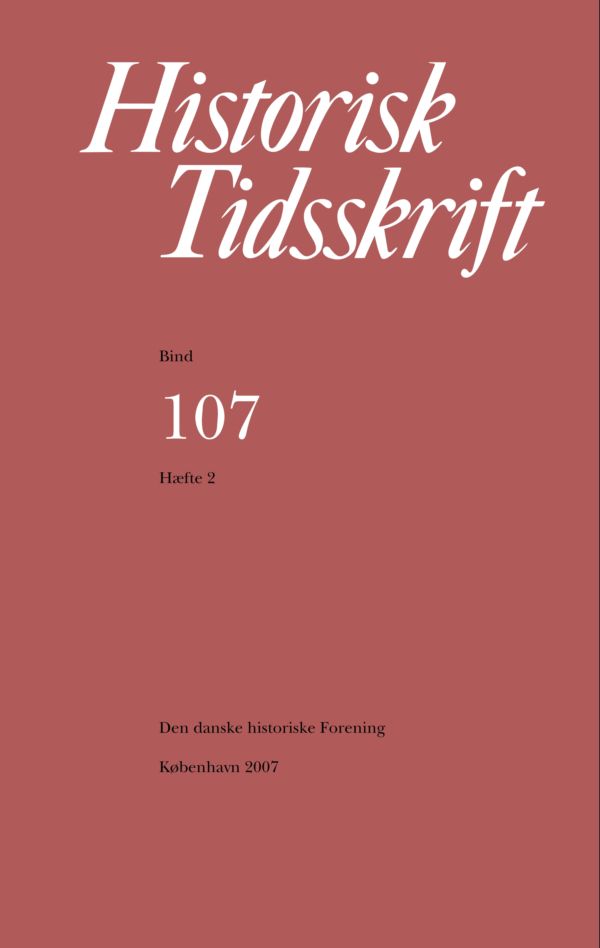Kong Niels. Skitse til en biografi
Resumé
King Niels: Outline of a BiographyBiography is a way of describing and explaining the life of an individual through successive phases. The tools of description and explanation are derived in part from general historical knowledge based on sources subjected to historical method, and in part from facts or theories about the biological course of human life through its various special phases, high points and decisive events, including, especially, biological chronology, which takes into account the biographee’s physical status and abilities in particular phases of life. Biography as a historical genre in the defined sense seeks thus to portray the course of an individual life with its historical social significance within a conceptual framework formed by general assertions regarding a human person as a biological being. The period of changes that befall a person at about the age of fifty would in the case of King Niels (born 1077 at the latest, King of Denmark 1104–1134) would have taken place in the mid 1120s at the latest and marginally at the beginning of the decade at the earliest.On the basis of an erroneous conception of the Roskilde Chronicle as an official history of the realm some scholars have concluded from the fact that King Niels is not mentioned prior to the celibacy controversy in the 1120s that the first two decades of his reign were devoid of dramatic events. Such a conclusion from silence is lacking in psychological credibility. It is simply a priori unlikely that a man who attained royal power at a mature age in a life rhythm, as described above, would have failed to make his mark in one or the other conspicuous way during the first ten to fifteen years of his reign. The present study therefore interprets his unrivalled success in organizing the monastic chapter of the Odense cathedral and the cult of St. Knud the King (deceased 1086), confirmed by the Pope in 1117, as a highlight of his life. By the same token the smoothly functioning family coalitions (e.g. the important role played by his Swedish wife, Queen Margareta Fredkulla), which strengthened Niels’ position at that time, are, with the support of Lars Hermanson’s research and that of others, interpreted as outstanding political accomplishments – in contrast to the subsequent degeneration and dissolution of these family alliances among the younger generation in the 1120s and after.The king’s influence on episcopal appointments, a matter treated rather superficially by earlier scholars, is not part of the politics of his active years, since at the time of his ascent to power he apparently had to accept the bishops already in office with no possibility of filling vacancies with his own choices before the 1120s. The present study argues that the controversy over celibacy among priests in the Roskilde bishopric afforded the first opportunity for the king to exercise his prerogatives in ecclesiastical politics. Other events in the life of King Niels can be interpreted in the same biographical perspective. After Poland had subjected the Pomeranians to its rule Niels worked with the Poles in planning a combined Danish-Norwegian-Polish naval expedition in the Baltic while opposing further German missionary endeavours on the island of Rügen. This was part of his long-range objective to secure the position of his son Magnus as successor to the throne. It was reinforced by Magnus’ marriage with a Polish princess, Rikissa, and by Magnus’ assassination of his rival to the throne, Knud Lavard in 1131. Furthermore, it can be shown that the magnificent church in Væ was built around 1120, thus during Niels’ reign, and that after 1134, when both Magnus and Niels were killed, the church’s patrons must have been Magnus’ widow, Rikissa, along with their underage son, Knud. These circumstances project an even clearer picture of a king engaged in strengthening his position in East Denmark, in order to retain Denmark’s status in a European concert, where his once favourable family coalitions were on the wane. Finally, the article addresses the issue of whether Archbishop Asser of Lund, in deserting Niels in his time of need, was motivated by European political moves to deprive Lund of its archiepiscopal status, and whether King Niels was, indeed, involved in these efforts.Translated by Michael WolfeDownloads
Publiceret
Citation/Eksport
Nummer
Sektion
Licens
Ophavsret til bidrag i Historisk Tidsskrift tilhører forfatterne og Den danske historiske Forening som udgiver af Historisk Tidsskrift. For illustrationer gælder den ophavsret, som står anført i billedteksten. Ophavsretslovens almindelige bestemmelser gælder, hvilket vil sige, at ophavsretten gælder i 70 år efter forfatterens død. Bidrag i Historisk Tidsskrift må derfor, med forbehold for en ”moving wall” på tre år, frit downloades, læses, gemmes, anvendes og citeres (med kildeangivelse) i privat og videnskabelig sammenhæng, men de må ikke helt eller delvis genudgives af tredjepart, heller ikke i redigeret form, uden tilladelse fra forfatterne og Den danske historiske Forening. Henvendelse skal i så fald rettes til Historisk Tidsskrifts redaktion på histtid@hum.ku.dk.





